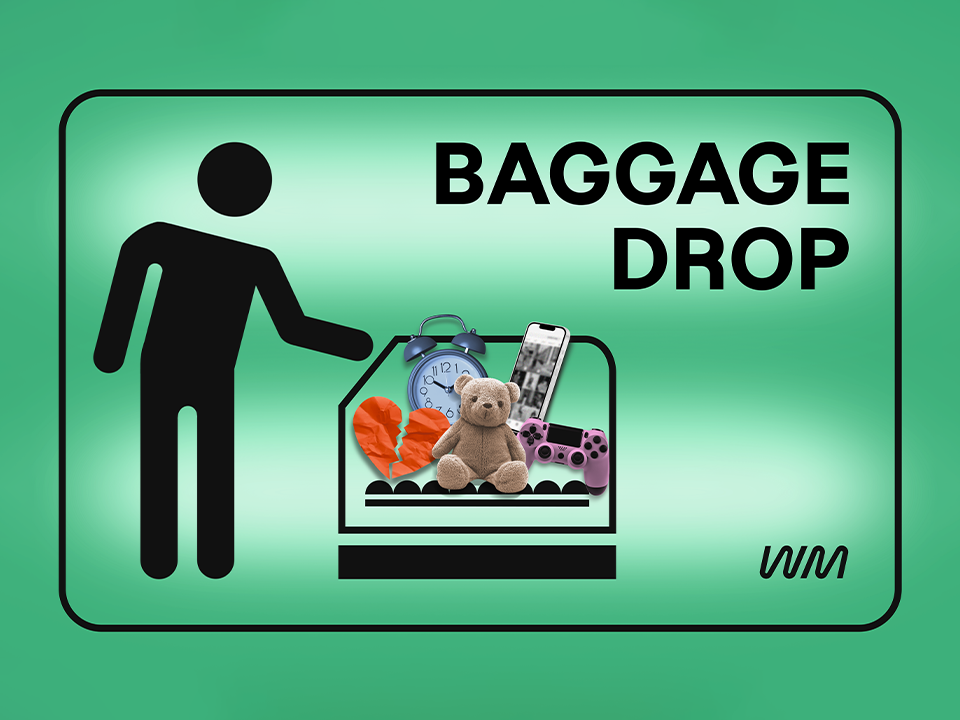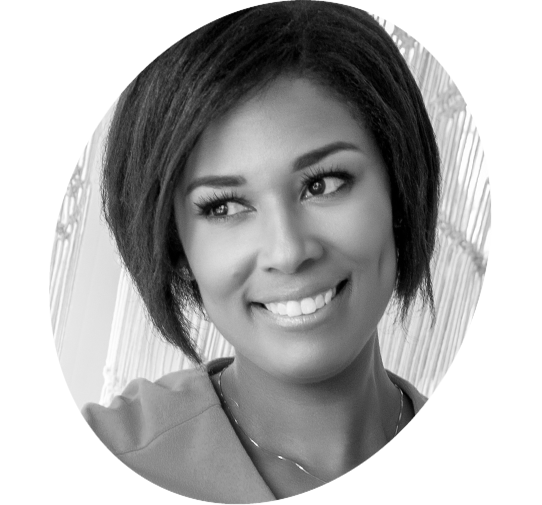Step 11 | Self-Talk: Taking Care of You


Nina Polyné, PsyD
Licensed clinical psychologist, consultant, professor, author, and speaker specializing in anxiety and the intersection between emotional, physical, and spiritual wellness
Dr. Polyné keeps our exploration of the growth spiral going ‘round as she details having the right tools in your back pocket for inevitable moments of setback. She assures us, road bumps will happen, so staying prepared is key to overcoming a negative bias. How will you embrace self-compassion and self-care to fit your needs? Listen to find out.
Download the How to Actually Measure Your Growth worksheet
Learn more about Dr. Polyné
(BAGGAGE DROP THEME BEGINS)
NINA POLYNÉ, PsyD, HOST: Hey! I’m Dr. Nina Polyné, and this is Baggage Drop: the show designed to help you let go of whatever weighs you down, so that you can reach higher heights when it comes to your mental health. This is episode 11 of Wondermind’s Baggage Drop!
(MUSIC BEGINS)
Okay y’all, let’s revisit what we talked about on Monday.
First, we established that non-linear growth looks more like a spiral that’s tighter at the bottom and looser at the top. We also talked about how this manifests in your body. You literally are more tight, rigid, and stressed when you start to make changes towards growth. Once you’ve spent time practicing, you’ll notice that the body begins to loosen up.
Then we discussed how setbacks can, and should, be expected as you evolve…and setbacks aren’t always bad. In fact, they can help steer you towards success.
VIOLA ROST: Yes, of course there's a positive side to a setback. It's a moment where you can recap. It's a moment where you can take, if you take that pause and you think about what was going well, but why is it not going well anymore, or what do I need to adjust? I like to think of setbacks as an adjustment period. You can readjust.
DR. POLYNÉ: That was clinical psychologist Viola Rost, who’s based in Germany. So regression can feel bad, but your coping mechanisms, and healthy habits that you worked on in previous weeks, will be your biggest assets in moments for growth. Now for a bit of a check-in: do you feel you’re still making progress towards your week one goals?
Does your growth still fit the life you intend to lead?
Remember: setbacks are completely normal in growth.
Unless you’re maybe, the luckiest person ever, or came into some form of likely-cursed magic, you need to know, there’s a lot in life out of our control. Things don’t always go as planned. But growth may empower us to better handle setbacks. One of the biggest things you can do to help yourself, is to simply stick with it.
Here’s clinical psychologist Viola Rost with more:
VIOLA ROST: For maintaining a new habit, there's actually a couple of check-ins that you can opt for. There's great apps where you can put in a goal and then you can see how you're reaching that goal. For instance, stopping smoking. You can put in how much money you're saving. And then after a week, you see how much money you've saved, after a month, after half a year. But you can also check in with a friend. You can say, "I have this goal of going jogging, so how about we meet at this corner, at this park and we go jogging together?" I also am a friend of Post-its. So you put your goal on that Post-it, and then you can track yourself. You can make little tallies. So that's another possibility. But I really like, kind of, having goals in communion, having them in community, where you share them with someone that's important to you, or a teacher or a trainer.
(MUSIC BEGINS)
DR. POLYNÉ: When we’re trying to grow and hit a roadblock along the way, negative bias makes our self-critical voice seem a bit louder. Like it has a megaphone.
And that voice fills in all the reasons confirming why you weren’t meant to grow or change.
Let’s hear what our friends in the Wondermind community shared about their inner critic’s negative bias:
(MUSIC BEGINS)
PIA GLENN, PRODUCER: What does your inner self-critic say?
[VOICE CLIP 1]: Oh God, that it's just chaos happening. Yeah.
[VOICE CLIP 2]: I mean, sometimes at work I feel like I have imposter syndrome and I feel like I can be more confident in speaking up and articulating my ideas, or sometimes I'll just not say them and then I get mad at myself.
[VOICE CLIP 3]: My inner self-critic is just that. I think it's just a constant fight with discipline. I think consistency is the hard part. So it's easy to have stretches of eating healthy or working out for whatever, one week, one month, but doing it for longer periods of time is something that I'm obviously pushing towards. But I tend to be a negative self-talker. So it's more of like when I don't do it, I beat myself up and when I do do it's just a, okay, that's what you should be doing.
[VOICE CLIP 4]: Self-doubt and comparison.
[VOICE CLIP 5]: Comparison is, I think, is the thief of joy. We were just talking about that with social media and before the internet and before social media, we think we have these skills. And then you see how good people are at so many things and you're like, immediately you're like, well, I'm never going to be that. I'm never going to be able to do that, so maybe I should just stop. But then you're like, wait, that doesn't make any sense. Why can't I just keep getting better and try to be good for my own sake? Because I enjoy it. And it took me a while to remember that.
DR. POLYNÉ: So, how do we make sure that pestering voice that we all have doesn’t hinder your own growth?
(BAGGAGE DROP THEME BEGINS)
And that takes us to our exercise for this episode:
First, let’s practice NOT ignoring that critical voice. Face it. Give it a name. Recognize how that feeling presents itself in your body.Tightness in your chest? Tension headache?
Validate that. Name that emotion that started this bodily feeling.
Then move, dance, sing, yell, cry, laugh, really just make any choice to get that feeling processed. Because trying to ignore negative feelings, or attempting to push them off until later, will only make getting back into growth harder.
So then, after acknowledging and dealing with negativity, and validating your emotions and body sensations, give yourself a moment of self-compassion. Use compassionate language to free yourself of that negative bias, and save phrases or mantras you know you have ready to make you smile. Things like, “It’s true, I’m hurt and that’s okay” or, “I made a mistake at work and I felt really guilty…and I am learning to forgive myself and accept that I’m not perfect.”
Always remember self-compassion. Wondermind advisor and psychotherapist Dr.Thomas Vance has some words of advice on how to handle that inner critic:
THOMAS VANCE, PHD: One strategy I would use is give yourself some worry time. I usually tell clients to set their phone for 10 minutes. And you sit there and you just worry. You have permission to acknowledge what is stressing you out, what is making you feel some type of way for 10 minutes, have a good time, have a “why me” party, have a fantastic time. But after that 10 minutes is up, it's time to regain our focus. Remind yourself of your why. I usually tell people, "Would you say the things that you say yourself out loud or to somebody else?" And a lot of times people will say, "No, definitely not. It's too harsh. It's really mean." And so then I challenge people to understand, well, why would we say that to ourselves?
DR. POLYNÉ: Another key technique for growth beyond positive self-talk is self-care. Just like we did with inner-reflection, arm yourself with the tools for acceptance and moving forward when things get tough. Give yourself a break. Take rest. Watch a show or listen to a song that makes you smile. Then try again. Self-compassion and self-care can be crucial for working through setbacks. As an example of something possible on this very topic, here’s a circumstance you may relate to if you’ve put others’ needs before your own. You may begin your growth journey up the spiral by setting rigid boundaries in order to protect your peace (and it starts to feel really good, right?), and then boom. You have a stressful interaction and you respond how you would have in your past…this might make you feel defeated, and uncertain if you can uphold the change in your behavior (your boundaries) for the long term. In moments like this, remind yourself that growth and change isn’t always automatic, comfortable or straightforward.
(MUSIC BEGINS)
And that’s it!
Remember: setbacks are just reminders of how far you’ve come!
You’ve got one more episode in Baggage Drop! Give yourself a huge congratulations on getting this far. Leave Wondermind a short voicemail at the link in our show notes, and share what qualities you celebrate in yourself! Just click the link in the show notes.
Tune in on Friday for a recap about our weeks of habit expansion, baggage dropping, and growth spiraling. You’ll also hear more voicemails about how other Baggage Drop listeners have grown too. It’s going to be fire!
Credits:
Senior Producer: Marisa Bramwell
Senior Writer: Amy Thompson
Producer: Jennifer Bassett
Producer: Pia Glenn
Audio Engineer: Joel Edinberg
Music: Epidemic Sound
Wondermind does not provide medical advice, diagnoses, or treatment. Any information published on this website orby this brand is not intended as a replacement for medical advice or a substitute for the advice of a professional, and you should not rely on it. Always consult a qualified health or mental health professional with any questions or concerns about your mental health


